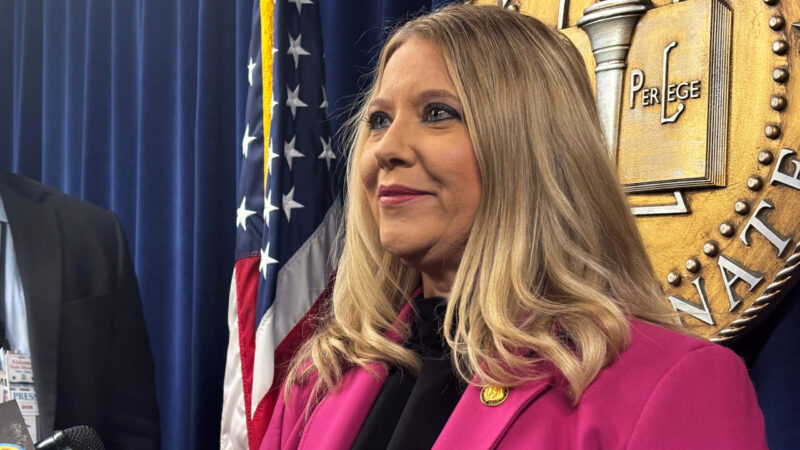Interview: Kim Thomas, Alabama Department of Corrections Commissioner
For the last several months, WBHM has joined al.com and the Center for Investigative Reporting as part of the Alabama Media Group’s investigative journalism lab. Together, we’re taking a look at Alabama’s prison problems. We want to hear from you. Call 205-336-5011 to leave a message and share your experiences.
Earlier this year, the Department of Justice accused Alabama of failing to protect prisoners at the Julia Tutwiler Prison for Women from sexual abuse and harassment from male officers.
To hear more on the issues and challenges facing the Tutwiler prison, Les Lovoy spoke with Alabama Department of Corrections Commissioner, Kim Thomas.
How do you personally feel like we’ve gotten ourselves in this mess with Tutwiler Prison?
Thomas: I think it’s unfair to catorgorize it as a mess. You know, if you look back over since 1980 when the criminal code was revised, and the advent of the habitual offender law. And, every single year, when the legislature comes to town, they generate more crimes that are felonies. So, over a number of years, the entire criminal justice system has been somewhat strained and stressed because of the high volume of convictions you have in Alabama. You realize that Alabama incarcerates the third largest state, as far as incarceration rates in the country. So, we’re in a state that is very pro law enforcement, very much had a lock them up and throw away the key mentality for a number of years. And not much foresight into what that creates.
There’s a philosophy that if you have a daunting objective, you look at it like an elephant on your plate. Instead of thinking you have to eat it all at once, you take one bite at a time. What bites do you want take first in making progress?
Thomas: You look back over the last 10 or 15 years, people in corrections have been trying to get people’s attention and support for decades. And it’s satisfying finally to get to see that people are discussing these problems and the public is concerned about them. Because if you want to incarcerate people, there is a cost associated with it. And, yes it takes awhile to start turning the Titantic. But I think we have made progress in identifying changes that will help us turn that Titantic and make improvements.
What do you see as solutions?
Thomas: This is not a Kim Thomas problem. It’s not just for the just the commissioner of corrections to solve. It takes all branches of government, both political parties working together and it takes the locals too. District attorneys need to be involved in helping solve the problem. The locals, with respect to starting a community corrections program and having an efficient and effective community corrections program, needs to be involved. Everybody needs to get to the table and help solve these issues.
And how about the correction officers/inmate culture inside of the prisons?
Thomas: Our officer inmate ratio is higher than the national average, obviously. National is five to one. We’re somewhere around 10-to-one. But that does have an impact. It is a stressful place. Prison is not a happy place. And when you have staff that is outnumbered, it’s very stressful work environment, it’s a very depressing work environment. And if you don’t focus on proper training, and not just providing training in a classroom setting, but really following through and making sure that training is transferred onto the job on an incident by incident basis or in real time. Then you’re sort of throwing your training away. That’s what we’re trying to do these days.
What keeps you up at night and think about the challenges that are ahead of you in this area?
Thomas: The desire to reform and change things, and taking so slow of a process. But, I’m also concerned about our staff. I’m concerned about the environment they have to work in. I’m concerned for the offender who really does want to change their life, and making sure our staff are staff are creating environment where there’s hope, because when people lose hope, then it’s very difficult to manage them. Those are the things that keep me up at night.
A ‘Jane Doe’ in the R. Kelly trials is ready to share her real name. And her story
A once anonymous R. Kelly survivor, Reshona Landfair is now ready to reclaim her voice.
Alabama seek to bring back death penalty for child rape convictions
Alabama approved legislation Thursday to add rape and sexual torture of a child under 12 to the narrow list of crimes that could draw a death sentence.
What a crowded congressional primary in N.J. says about the state of Democrats
The contest is one of the first congressional primaries of the year where we will find out what issues are currently resonating with some Democratic voters. Here are some key things to know.
At NOCHI, students learn the art of making a Mardi Gras-worthy king cake
With Carnival in full swing, the New Orleans culinary school gave its students a crash course — and a rite of passage — in baking their first king cake.
The Winter Olympics in Italy were meant to be sustainable. Are they?
Italy's Winter Olympics promised sustainability. But in Cortina, environmentalists warn the Games could scar these mountains for decades.
Their film was shot in secret and smuggled out of Iran. It won an award at Sundance
Between war, protests and government crackdowns, the filmmakers raced to finish and smuggle their portrait of Tehran's underground arts scene to the prestigious film festival.






